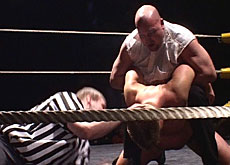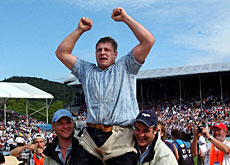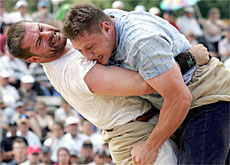Wrestling puts Switzerland in a neck hold

Traditional Swiss wrestling or Schwingen has been around for hundreds of years, but it now faces a new challenger.
swissinfo met two of the increasing number of brave youths who are being enticed away from Schwingen by the glitz and glamour of a more modern form of wrestling.
Marco Jaggi, whose wrestling stage name is Ares, is considered a local hero.
The former heavyweight champion is one of three Swiss wrestlers who compete outside the country.
About ten other wrestlers compete domestically, among them former breakdancer, Fabian Mori.
Swiss matches often attract a few hundred spectators but wrestling bouts have yet to make it to television screens.
Until they do, one way of seeing the sport close up is to visit the practice ring set up in a cowshed on a farm in Kallnach, canton Bern.
The barn resounds with the thump of bodies hitting the canvas, the twang of the ropes as men hurl themselves on top of each other and loud grunts as one holds the other in a painful head lock.
The cows, meanwhile, chew the cud and look on nonchalantly.
Loud-mouthed monster
Jaggi first took a serious interest in wrestling in 1998, attracted by the combination of sport and acting.
Unable to find any training opportunities in Switzerland, he attended a four-week wrestling camp in Berlin. Within three weeks, he was competing in the ring.
Seven years on, Ares is well known on the European wrestling scene as one half of the Swiss Money Holding tag team.
Jaggi runs, pumps iron, and trains in the ring three times a week.
By his own admission, Ares is a loud-mouthed monster in the ring, who breaks all the rules.
Outside, he’s a polite, hardworking student, studying for a degree in economics and computer science at Zurich University.
New identity
“In the wrestling ring, you can assume a new identity. I like to play the bad guy. I cheat when the referee is not looking,” says Jaggi.
He would like to become a professional wrestler after graduation and is considering moving to the United States.
“In Europe, wrestling is not very well paid. You can earn a little but the pay is good in the US, Mexico and Japan.”
Jaggi is disappointed at the amount of time the sport is taking to gain popularity in Switzerland.
“Most people think wrestling is not a real sport. But they have never been to a wrestling show. Those who actually come to watch can see how athletic it is,” he stresses.
Finding new wrestlers to participate is difficult. Jaggi says most people who start to train quit after the first week.
“It’s really hard to find people who are dedicated enough to train every week and who are willing to take the pain.”
Air 2 Style
Mori is a trained machine mechanic and part-time student.
On stage, he is Air 2 Style, a Swiss Wrestling Federation Light Heavyweight champion.
The former breakdancer was attracted by the showmanship of wrestling.
“It’s not just a fight, we try to act a role,” he explains.
“My speciality is speed – I do a lot of acrobatics in the air, and technical things. Strength is my weakest point.”
Mori says he always comes away from a match with bruises. “The secret is to train hard to minimise the amount of pain.”
He adds that it is vital to assess the opponent before a match. “You have to look and see where his weak points are.”
Mori has little doubt that wrestling has a bright future in Switzerland.
“Audiences will always want to watch how people fight and find out which competitor is better.”
But whether the showmen can succeed in permanently wrestling Swiss fans away from their traditional Schwingen remains to be seen.
swissinfo, Julie Hunt in Kallnach
Wrestling terms:
Bump: A fall or hit, which takes a wrestler out of the ring
Shoot: Match where one wrestler is really trying to hurt another
Work: A sham match – the opposite of Shoot
Job: A staged loss
Stiff: Moves causing real injury
Originally the Swiss mountain farmers, the Sennen, measured their strength and skills through Schwingen.
It is still hugely popular in rural areas and is generally accompanied by traditional markets, beer-quaffing and hearty sausage-eating.
Wrestling was introduced into the ancient Olympics in 708 BC, shortly after the Games’ recorded history began in 776 BC.

In compliance with the JTI standards
More: SWI swissinfo.ch certified by the Journalism Trust Initiative



You can find an overview of ongoing debates with our journalists here. Please join us!
If you want to start a conversation about a topic raised in this article or want to report factual errors, email us at english@swissinfo.ch.